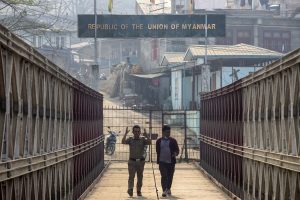India intends to scrap a free movement zone across it’s border with Myanmar after repatriating about 150 soldiers who crossed the frontier amid heavy fighting launched by the rebel Arakan Army in the north, where the junta is struggling to hold its ground.
The zone had provided a safe area for people fleeing the fighting, which has escalated sharply since October, but Indian Home Minister Amit Shah has proposed an end to the zone, to be enforced by the construction of a fence along the 1,631-kilometer border.
During a visit to the northeastern Indian state of Assam, Shah said his government had “decided to fence the entire open India-Myanmar border,” adding that is “going to end this facility,” according to Times of India.
The announcement followed the repatriation of 151 soldiers through an airlift organized by the Myanmar military out of the Mizoram Lawngtlai district, including nine who had been wounded, four critically.
Gen. Manoj Pande told a press conference earlier this month that a further 416 Myanmar soldiers had been repatriated after anti-junta forces seized control of key towns and military bases near the Indo-Myanmar border, alongside Myanmar citizens who sought refuge in Mizoram.
The free movement zone is largely uninhabited but enables relatives and locals from either side with passport and visa-free access within 16 kilometers of both sides of a border that cuts across the Himalayan mountains and through heavily forested lowlands.
No timeframe has been set for the construction of the fence, though India has also fenced more than 2,000 kilometers of its border with Pakistan and a further 3,100 kilometers with Bangladesh.
Repatriations follow media reports that Myanmar’s military junta had sentenced six brigadier generals to death and life imprisonment following their surrender to resistance forces in northern Shan State earlier this month.
Losses at the hands of the Arakan Army and other ethnic rebel organizations have also prompted a recruitment drive by the junta, which seized power from the elected government of Aung San Suu Kyi three years ago, triggering the country’s return to civil conflict.
According to the Than Lwin Times, the junta has faced “grievous losses in nationwide battles resulting in severe depletion of troops,” prompting the governing military council to employ an array of tactics to recruit individuals under the pretext of promoting peace.
It said the junta was exerting pressure on local governors to establish militia units in select townships and villages within the Bago, Magway, and Ayeyarwady regions. Typically, the military is demanding 10 recruits for every hundred people within a village population.
If governors fail to provide recruits, then they risk being classified as part of the People’s Defense Force (PDF), the armed wing of the National Unity Government, which has established itself as the main alternative political party to the junta.
However, many of the villages are bereft of fighting-age men, with many young men and women joining the ranks of the various rebel groups. That has resulted in village chiefs calling on seniors to protect their homes by signing up under the junta.
“We have been informed by village elders that, if we don’t contribute manpower to the militia, our village might be labeled as pro-PDF and blacklisted,” one villager said. “The Military Council indirectly threatened to burn down such villages, leaving us with no choice but to comply.
As a result, he said, “Our village sent five villagers for militia training, but due to our reluctance, only those aged 50 or 60 were asked to register for the sake of the village… We provided these recruits only to avert potential harm to our village.”
In a bid to bolster its ranks the military administration has offered the enlisted militia ranks basic military training and the job of securing villages and communities in return for a monthly salary of 120,000 kyat (about US$57) and a bag of rice.
































